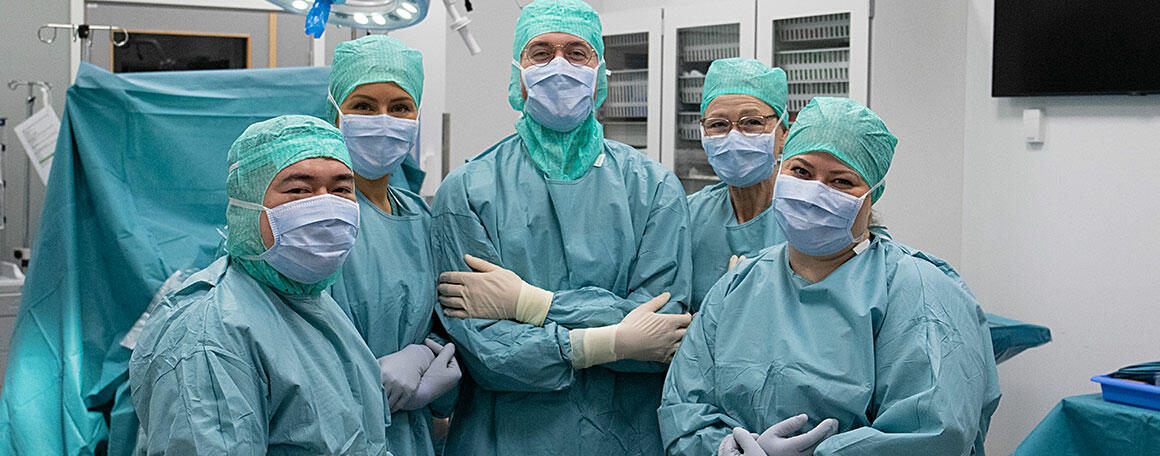Department of Nursing and Health Sciences
The Department of Nursing and Health Sciences is the third largest Bachelor's degree in nursing in Norway, spread across three campuses: Porsgrunn, Vestfold and Drammen. We educate nurses who will be well prepared for working on a daily basis in the health service of the future. The Department also has a wide range of Master’s degrees (clinical health work, advanced clinical nursing, midwifery, intensive care, aesthesia, health care nurses) and continuing education programmes such as health guidance and geriatric assessment expertise.
Research
The Department of Nursing and Health Sciences conducts research in respect of our fields of study and the actual programmes that we run. The Department has the following research centres and established research groups:
- Advanced nursing practice
- Center for Care Research, South
- Center for Women's, Familiy and Child Health
- Science Centre Health and Technology
- USN Research Group on Older Persons’ Health
- Clinical expertise in nursing studies
Regional cooperation
The Department wishes to be a strong regional partner and is able to offer both course and research services.
Our study programmes
Bachelor’s degree in nursing – Flexible part-time study programme
There is a great need to increase nursing competence in rural municipalities. We want to offer studies where people live and work. We have therefore developed this part-time study programme in nursing for those who live in certain municipalities in Telemark.
Where does the teaching take place?
We have a strong collaboration with the municipalities targeted by this study programme. Upon completion of your studies, you will therefore have nursing skills that are in demand for rural nurses.
For Telemark, Notodden will be the main campus, but it may also be possible to use our campuses in Bø and Rauland.
To be eligible for admission, students require a residential address in one of the following municipalities: Drangedal, Fyresdal, Hjartdal, Kviteseid, Midt-Telemark, Nissedal, Nome, Notodden, Seljord, Tinn, Tokke or Vinje.
How does the teaching take place?
This study programme has a high degree of flexibility in terms of teaching and learning. We offer synchronous (real-time) and asynchronous (recorded) online lectures and supervision in combination with local sessions. We focus on active and self-directed learning, collaborative learning and the use of digital resources (videos, podcasts, websites etc.) and digital tools.
The flipped classroom is a teaching method that turns traditional learning on its head. In short, students work with various learning resources before a session, while the session is dedicated to active learning. Essentially, what traditionally takes place in the classroom is swapped around. This requires good self-directed learning skills. You will also be supervised as you progress and your work will be subject to a final assessment by teaching staff and fellow students. Many of the learning activities involve collaborative learning before, during and after the session. The purpose of the learning groups is to help create a learning community that fosters motivation and development through the in-depth study of literature, dialogue and the sharing of knowledge.
Webinars and clinical practice in the part-time study programme
The study programme will have approximately three in-person sessions and 29 webinars per semester. This is set for the 1st semester but will be determined in closer consultation with the field of practice and eventually with you as well. You will be assigned to a learning group where advanced practice nurses in the municipality, who hold joint appointments at USN, have a specific responsibility for supervision along with other USN staff.
Clinical practice
Clinical practice and practical studies constitute half of the study programme in nursing. In clinical practice, you have the opportunity to apply theoretical and practical knowledge and practise the values of the profession. In the part-time programme, the clinical practice model has been developed in collaboration with the field of practice. To ensure maximum flexibility, clinical placements mainly take place in your home municipality or a nearby municipality.
To maintain the principle of part-time flexible studies, clinical placements can be carried out over an extended period of time.
What you will learn
A nurse works with people and focuses on how illness and treatment affect the patient’s life and quality of life. Topics such as health, vitality for life, coping and everyday rehabilitation are therefore an important part of nursing education.
As a nurse, you need a solid theoretical knowledge base. Fifty per cent of the study programme is an introduction to nursing science, natural science and social science knowledge areas, including nursing, anatomy/physiology, pharmacology, pathology and microbiology, psychology, pedagogy, clinical communication, ethics, and leadership and administration.
Great emphasis is placed on integrating and using theory from various knowledge areas in skills training and clinical practice. We have a strong collaboration with the local authorities targeted by this study programme. Upon completion of your studies, you will therefore have nursing skills that are in demand for rural nurses.
We are known for our close and effective dialogue with our students throughout the course of their studies. We will facilitate active and self-directed learning processes with a high degree of collaborative learning, and the use of digital resources (videos, podcasts, websites, etc.) and digital tools.
This part-time study programme is 75% of the full-time programme over 4 years, which means you should expect to dedicate approximately 30 hours per week to your studies. We therefore recommend that you do not work more than 50% alongside your studies.
